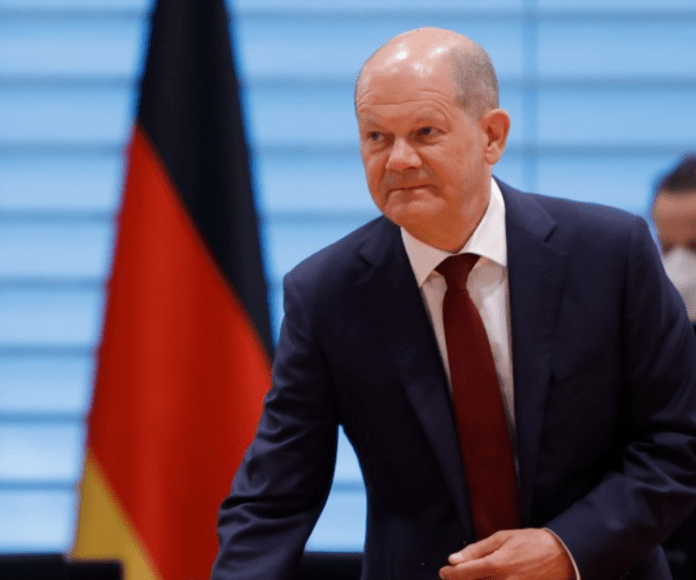Monday, 25 April 2022 10:49 PM
The European official told Newsmax that the Biden administration has also been pushing the Germans to delay cutting off Russian oil until later this year and after the U.S. midterm elections.
The White House appears to believe it has a chance to keep the Senate in Democrat hands – but that opportunity could be endangered from a serious spike in oil prices if Germany had to start buying oil from global markets.
Earlier this month, President Biden signed a law that bans all Russian imports of oil, gas, and coal to the U.S.
House Speaker Nancy Pelosi, D-Calif., and other Congressional Democrats, led the charge on banning Russian oil imports.
German Foreign Minister Annalena Baerbock announced last Wednesday that Germany will stop importing half of its oil from Russia by summer with the remainder closed down at year’s end.
But those comments were quickly qualified by Germany’s Finance Minister Christian Lindner, who suggested that a quick cut-off of Russian oil won’t happen anytime soon.
Ukraine has been pleading with European nations to halt imports immediately and put as much pressure on Russia to halt their unrestricted war.
Ukrainian President Volodymyr Zelenskyy has called EU oil purchases “blood money.” The EU continues to pay Russia about $1 billion a day for oil and gas purchases.
Germany also indicated that while Russian oil imports would be banned by the end of this year, gas imports purchases could continue into 2023, but be banned soon after.
“Imagine how many missiles and bombs you can buy for that kind of money,” he told Britain’s Guardian.
” . . . They do not understand that by supplying this money to Putin, they are funding his military machine.
“If Russians are committing war crimes, even genocide, whoever is supplying Russia with this bloody money is guilty of the same war crime.”
EU nations have been reluctant to ban Russian energy. In March, Poland took the lead in banning Russian coal imports by May with plans to stop all oil and gas imports by year’s end.
Francesco Stipo, an international oil expert and president of the Houston Energy Club, said Germany’s reliance on Russia for its energy consumption has risked jeopardizing European energy independence.
“All NATO members, including Germany, should end Russian oil and gas imports as soon as possible to give a strong signal that the unprovoked invasion of a sovereign country is not permissible,” he said.
“The German announcement to stop Russian oil imports by the end of the year falls short of expectations, because by that time, Russia will have probably already achieved its objectives in Ukraine.”
After Baerbock’s announcement of a coming ban, German unions and economic institutes warned that abruptly stopping Russian energy imports could spark a severe recession.
Oil experts predict more U.S. gasoline price hikes will come once Germany does cut off the supply and a rise at the pump could threaten Democrats’ election odds if it happens before election day.
Justin Dargin, senior energy and geopolitics scholar at the University of Oxford, said global oil prices will “undeniably” increase once Germany cuts off oil imports.
“If Germany were to cut off oil by this summer, then we would again see at first a sharp increase in the international oil price, such as when the Biden administration banned Russian hydrocarbons,” he said.
Once the “initial sharp fluctuation stabilizes,” he said, “what follows later are the structural demand and supply dynamics that inform the more stable oil prices that last for a more extended period.”
In delaying ending oil imports until the end of the year, Dargin said there will still be an increase in global oil prices.
According to the International Energy Agency, nearly half of Russia’s crude and petroleum product exports wind up in Europe. The amount totals 2.2 million barrels per day of crude oil and 1.2 million barrels per day of petroleum products.
Germany is the top EU buyer of Russian oil, purchasing 34% of its total petroleum imports from Russia, according to the IEA.
“Germany’s action by itself will impact global oil prices, but a more significant impact will be what course of action Europe as a whole takes,” Dargin said.
“It seems likely at this stage that Europe will likely take a more phased approach to wean itself from Russian oil in a bid to moderate any adverse effects on the continental economy that is already experiencing high inflationary pressure.”
If the E.U. were to move to ban Russian oil imports immediately, he said global oil prices would increase.
“An immediate European oil ban could affect nearly 4 million barrels per day of Russian petroleum and would apply excessive upward pressure on global oil prices,” Dargin said.
He noted that a complete cessation of Russian oil imports to the EU could drive prices to as much $200 a barrel globally.
The White House declined to comment on this story.
© 2022 Newsmax. All rights reserved.




